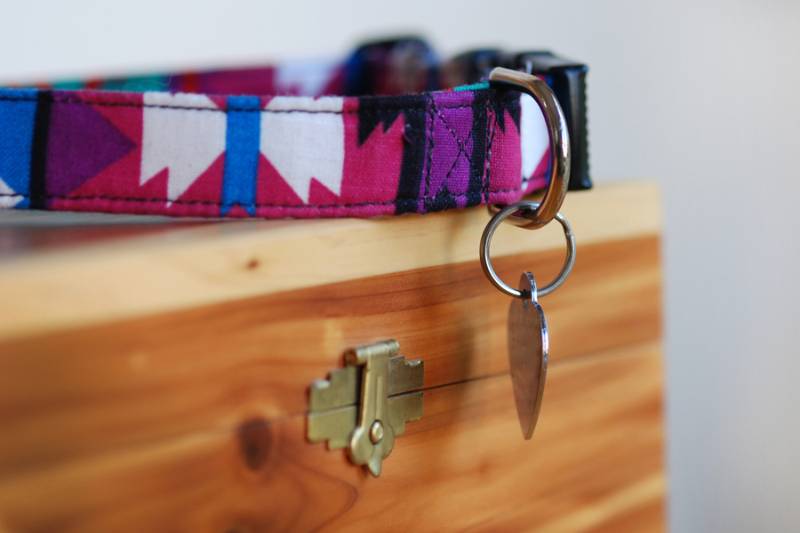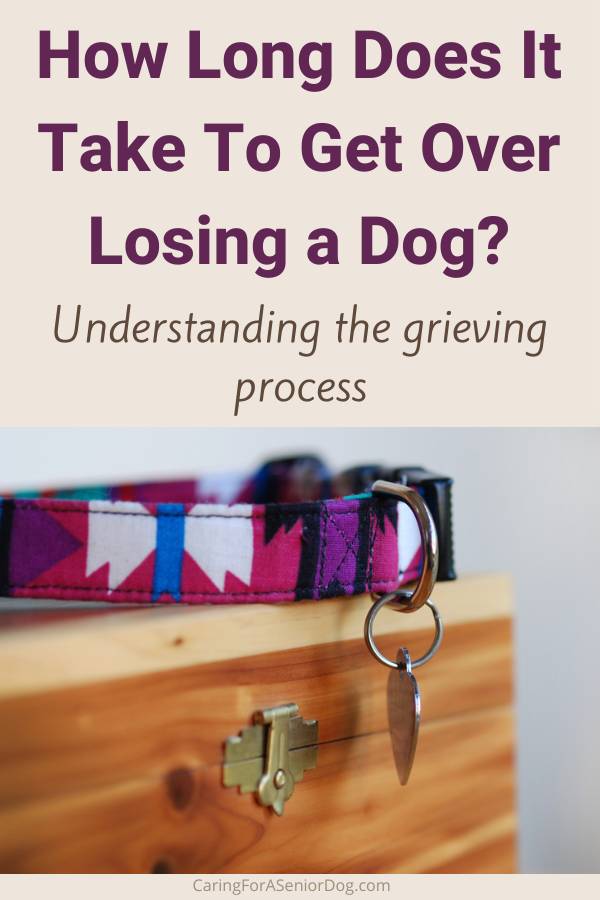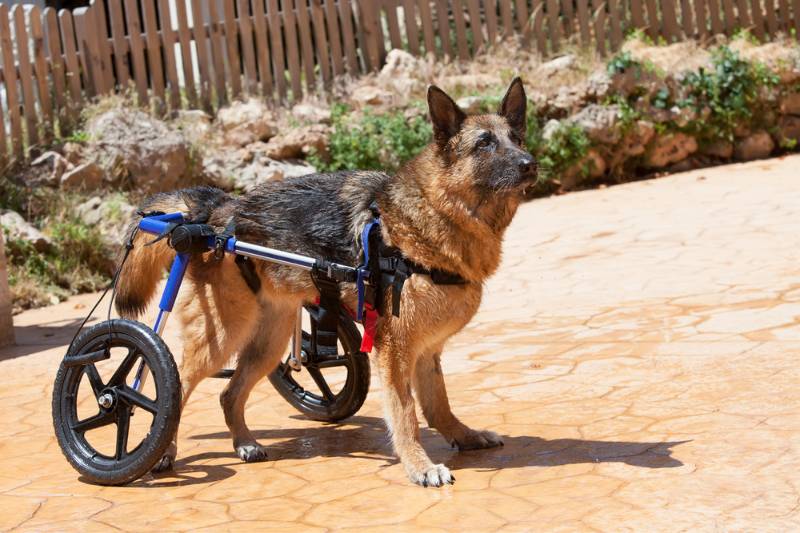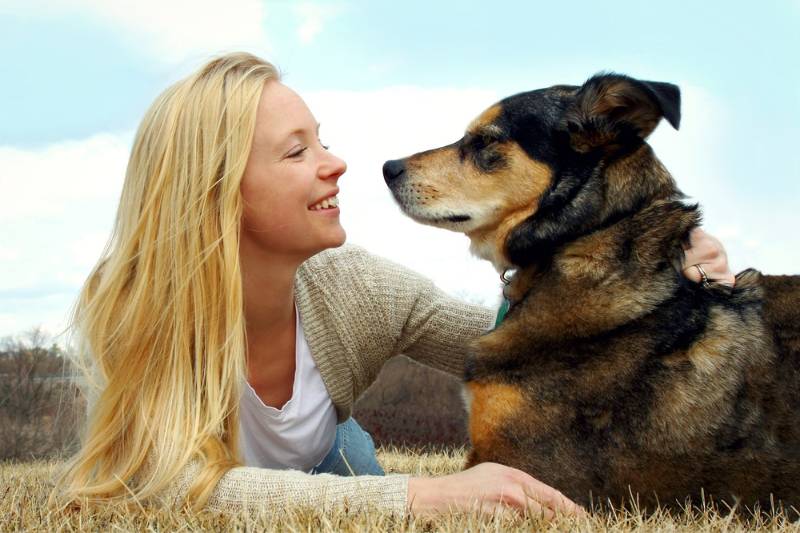For as much joy that our dogs bring to our lives, the end will feel exponentially more difficult. You may find yourself wondering how long it will take to get over losing your dog.
Grief is a very personal process and looks different for everyone.
While some people can move on within a month, it can take much longer for others.
Several factors go into the length of time it will take to process the grief of losing a pet.
The important part to remember is that there is no wrong or right way to grieve.
Feeling heavy, bursting into tears suddenly, or acting moody after a beloved pet dies is completely normal. These emotions are simply a part of the healing process.
This article takes you through the grieving process so you know what to expect and includes some suggestions to help heal your broken heart.
How Long Does It Take To Get Over Losing a Dog?
Unfortunately, this question has no definitive answer since everyone handles grief differently. Various factors can play a role in processing the loss.
Friends without pets may not understand how you feel and will tell you it’s “just a dog,” which can put pressure on you to “get over it.”
Depending on the bond you shared, how long you had your dog, and how they died, your grief could last months to years.
Losing a Pet Suddenly
The sudden loss of a pet may take longer to get over since there was no way to prepare for the death.
Many dog owners will feel guilty because they realize they didn’t spend the time they wished they had with their pet before they died.
Comparatively, when you lose your dog to cancer or another long-term illness, you may find it easier to get over the loss because there was an opportunity to mentally prepare for the imminent death.
The Strength of Your Bond
If you and your dog shared a close bond, especially if they were your “heart dog,” the loss will be extraordinarily difficult.
Pets are members of our family, and the love and bond that goes with their death can leave many feeling lost.
Whether you have time to prepare for the loss or not, the vacancy of your best friend in your life will leave a deep hole.
Personal Experience With Loss and Grief
Experience with frequent loss of pets or humans generally goes two opposing ways.
It can either make one feel more practiced with the grief process resulting in a quicker rebound, or it can compound all of the pain someone has felt throughout their life, causing them to feel heavy and wonder why life is so unfair.
Euthanasia vs. Natural Death
While many owners prefer their dogs die from a natural death, the truth is that most of the time, we have to make the decision to euthanize our dogs due to pain or other ailments that affect their quality of life, like dementia.
Making this decision never comes easily, especially since we must make a difficult choice for a being who cannot tell us what they want.
The act of taking a beloved pet to be euthanized is traumatizing and unnatural.
Grieving the loss of a pet after euthanasia will take time and can prolong the process.
If the option is available, many owners find more peace in performing the euthanasia at home.
Stages of Grief After Losing a Pet
The five stages of grief can be used as a guideline as you navigate through processing the loss of your dog.
Familiarizing yourself with them will help you understand what you can expect as you move through the stages.
There is no exact formula or order for the process. You may bounce around, skip over some stages, or go through them in order.
Denial
This emotion is generally the first most experience after going through a loss, especially if it happened suddenly. Denial works by suppressing other emotions to keep us from feeling overwhelmed.
Anger
As you move through denial and begin to question what happened and why, you may feel angry and start to place blame for the loss. You may feel angry at yourself, the veterinarian who diagnosed or missed a disease, or other family members.
Bargaining
In the bargaining stage, you’ll ask yourself “what if” questions that may have changed the outcome of your pet’s death.
“What if I had taken them to the vet earlier?” “What if I hadn’t forgotten to give them their medication that day?”
The answer to these questions cannot change the circumstance of the pet you just lost, and it’s easy to become stuck in this stage, riddled with grief.
The best way to overcome this stage is to forgive yourself, accept that you did the best you could with the information you had at the time, and learn from your perceived mistakes.
Depression
Losing a pet hurts profoundly, and feeling extreme grief is natural.
Maybe you find that you can’t stop crying or worry that you’ll never stop feeling sad that your dog died.
This is all ok and perfectly normal.
Where the depression sets in is when it affects your daily life.
If you find that you can no longer function or feel happy, you may need to seek help from a professional to help process the loss.
Acceptance
Not to be confused with “getting over it,” acceptance simply means that you have accepted that your dog is gone.
It doesn’t mean you moved on for good or will forget about them. You will always have the memories to bring them back.
When Your Dog Dies, and You Can’t Get Over It
Losing a pet hurts so much, and the sadness you feel over your dog’s death may feel like it will never go away.
Again, these feelings and emotions are entirely normal, and when you feel ready, there are a few ways to help distract yourself from those feelings and redirect your thoughts.
Focus on Happy Memories
The last days and moments of your dog’s life will stick with you for some time, replaying in your head.
Remember, those final moments are just a snippet of the life you and your dog shared.
Try to focus on the happy times.
Think about your favorite trips or hikes. Laugh about when they stole the pizza off the counter when no one was looking. Remember the time they were there for you when you needed them.
Honor Your Dog’s Life
Ceremonies can be a helpful way to honor a loved one’s life.
Whether you prefer to host an intimate ceremony with just you in a special place, or invite a group of friends and dogs over for a gathering, think about a way to celebrate your dog.
It’s a nice way to see the impact your dog had on others.
You may even learn some things or hear stories you had never heard.
Decide What to Do With Their Toys and Gear
Seeing your pet’s toys and gear around the house will undoubtedly serve as a reminder that your dog is no longer there.
There is no right or wrong way to deal with your pet’s belongings after they die. You just have to figure out what works best for you.
Here are a few suggestions:
- Keep the special items, like a collar, leash, or bandana, and put them on display somewhere
- Put your dog’s bed away before you come home from the euthanasia
- Donate toys to a local shelter
- Reuse the toys with a new future dog
Help Other Pets Process Their Grief
If you have other pets in the house, you may notice that they are going through their own grieving process.
While many dogs may continue about their lives as if nothing happened, some are noticeably affected by the absence of their friend.
A few ways to tell if your dog is grieving include:
- Destructive behaviors
- Lack of appetite
- Increased anxiety, especially when left alone
- Lethargy
- Searching for the other dog
Bringing other pets along for the euthanasia, or having it done in your own home, allows them to see what is happening.
They will understand, even if it doesn’t seem like they do.
Try your best to maintain the same routine at home to help them (and you!) get out of their rut.
Conclusion: Grieving After Losing a Dog
The bond between a person and their dog is deep and personal, and navigating the grieving process after their loss is difficult. There is no way to sugarcoat that.
However, it is important to remember that grieving is natural and necessary for healing.
Allow yourself the time needed to feel your emotions and mourn your loss. Don’t hesitate to ask for support from loved ones or a professional.
The pain may never fully go away, but in time you will be able to look back on the special memories of your pup and know that their love will remain with you forever.



 Help! My Old Dog Is Losing Muscle Mass and Getting Weak in Their Hind Legs
Help! My Old Dog Is Losing Muscle Mass and Getting Weak in Their Hind Legs
Leave a Reply